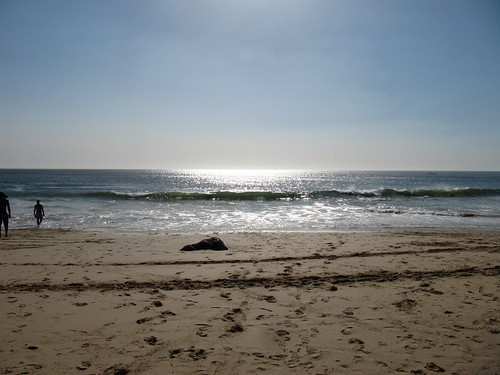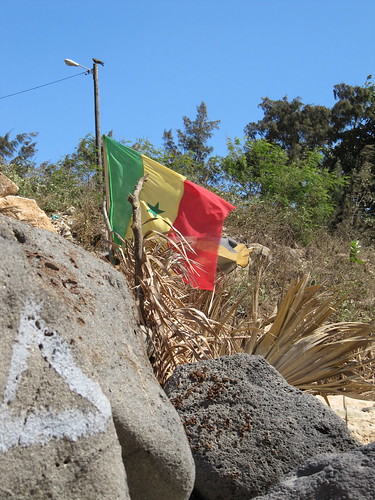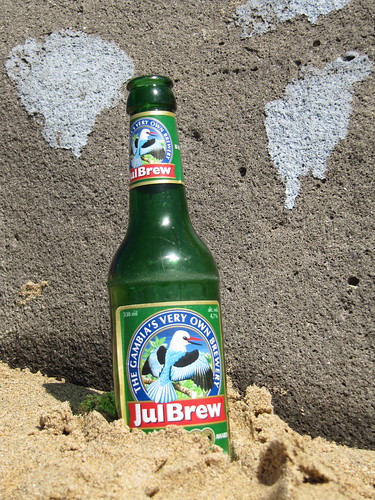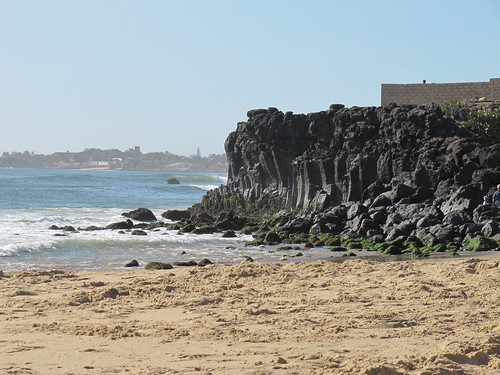The new name of my game here in Senegal is maritime security. Enjoying 330 miles of pristine coastline, I have asked to drop out of school and instead take a stab at studying the complexities that make protecting these waters assez complexe. As a sailor and fidèle of the ocean, my big hope is that over my remaining nineteen months in Senegal I will have pursued a course of study that is not only worthwhile, but will have useful application to my services as a naval officer…
…or the Navy might just send me back to the North Korea shop and I’ll soon forget where Senegal was ever actually located. That’s probably the most likely scenario, given my advanced military logic faculties.
So I am on track with plenty of motivation to commence my independent research project. But where to start?
This is too easy. Go to the beach.
Even out here, I look out from the rock that I am laying in front of and can see that even the beach caretakers carry out their duties under some semblance of patriotic oversight. They too are about maritime security! Thus far, I am a model Olmsted scholar.
I also see the value in connecting security with state-to-state involvement, which means that my work will certainly bleed over into Senegal’s neighboring countries. To wit: I was supposed to be in Cape Verde this weekend but instead got stuck in Dakar. Always keen to make lemonade out of a less-than-ideal situation, I opted to tote some Gambian beer to the beach and try to salvage some cross-border research. I can sense that you are impressed with my level of ethnographic know-how
Okay, so instead of just “researching” I also got a great tan horrific sunburn that day. The beaches in Senegal are really gorgeous, and while I have driven by this particular one many times before, I’d never spent any amount of time there. The beach in question is located in Almadies- the area of Dakar that is today known as a mecca for the noveau riche and the expat community. Beachside areas like these traditionally belong to the Lebou people who are fisherman, and also possess a certain amount of mystical powers.
Everyone knows that the beach has supernatural powers. It’s not just the State and competing interests watching out for its best interests…
Gambian beer consumed, we opted to patronize the beach “attendants” on their offerings of cold beer for sale. In Senegal it’s always good to support the local business hustle because by doing so you can 1) perpetuate the stereotype that the Americans are much nicer than the French or Lebanese and 2) you know that their income is ridiculously lower than yours. What harm is one beer?
A lot, as it would turn out.
Have you already forgotten what I have told you about the supernatural Lebou people above? Try to keep that in your brain for a second. We were finishing our cans of locally-procured beer when a man came over and asked us if we spoke French. Oui, we do- so he proceeded to tell us that we needed to hide our beer in plastic bags. This beach is special- it’s protected.
Protected- as in maintaining maritime security, you mean? Um, no. Well actually- maybe…
“Who is protecting this beach?” we asked. The man responded with completely serious face: “The marabout.”
“Where is he?” my beach companion asked.
“Up there.” the man pointed into the cloudless sky. In that moment it hit me, since I knew exactly what he was talking about. I am so not the model Olmsted scholar.
Here’s some trivia: the name Almadies is derived from “al madhi”- or a messianic leader who according to popular Muslim belief will appear before the end of the world and restore justice and religion. The Lebou people who essentially own this beach belong to Senegal’s Layene brotherhood, the smallest of the four major Islamic brotherhoods. In the late 1800s, a Lebou man declared himself to be the madhi. While he was at first he was thought to be crazy, certain miracles occurred and eventually history took care of itself; he developed a large following of believers. Dying in the early 20th century, his son Issa Sedinya became a holy man. His face adorns many walls and structures around this particular beach.
Maritime security, my ass- this is probably the original definition of the concept.
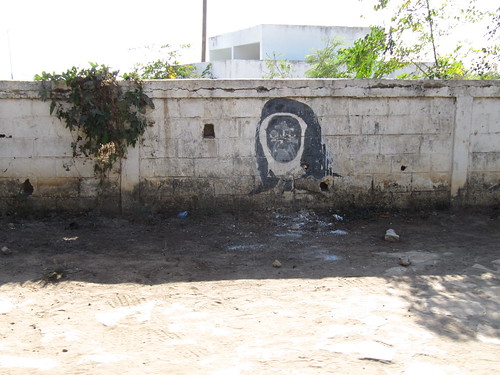
I am not one to mess with governmental or religious forces, so I apologized to this man for drinking beer and potentially upsetting the marabout who is watching over this fine stretch of sand. Still, the cynic in me was saying with my inside voice that the marabout can probably see through a plastic bag and still disapproves of alcohol consumption (and sale) on his beach. But I’m willing to play the game in order to enjoy a nice day on the beach that helps me to kick off my new research endeavors in good fashion.
It’s also nice to have a little respect for local customs and cultures (that’s the good Olmsted scholar in me talking).
Postscript: I feel compelled to end with one disclaimer. I am no scholar of Islam, or even local religious beliefs in Senegal (I told you, my new passion is maritime security). I have no doubt that some of my facts here have been confused or are flat out wrong. I am still plowing ahead though in a humble quest to provide a bit of background on the diverse culture that comprises Senegalese life. I hope that I have gotten things mostly right. If you are really interested in learning more, I highly recommend that you log off the computer and come to the beach. Airport code is DKR.
